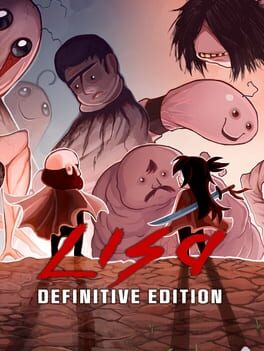This review will speak about both The Painful and The Joyful games, and what the Definitive Edition has added to them
The LISA duology has always been one of the top games when speaking about indie RPG Maker games (not counting The First, since it's a Yume Nikki kind of game), and being its release date one year prior to Undertale's, the other juggernaut of the genre, and being both inspired heavily by the MOTHER series, it's important to point out how different LISA plays when compared to anything else.
The LISA Duology takes on a lot of dark subjects, such as abuse, emotional manipulation, drug addictions or abusive environments, but it does those things in a subtle way, instead of straight telling a story, the game focus instead on the journey of their protagonists, who, initially, we know little about them, and exploring bit by bit their traumas, their inner thoughts and their fears.
The humour of this game in my eyes is excellent, the game knows how to mix a serious, dark setting with dark jokes and gags that don't feel out of place, and a lot of the time reinforce the narrative the game wants to go for.
In terms of the protagonists, in The Painful we'll play as Brad Armstrong, and in The Joyful, as Buddy, his adoptive daughter. Brad, is in my opinion, a magnific main character, he's obviously flawed, and he's far from being a good person, but that doesn't stop him from being sympathetic, and in the end, he feels like a person trying to do the best he can to improve as a person, and you can empathize with him.
In the other hand, I didn't feel the same with Buddy, I think her goals are just stupid, and I feel like her character arc in Joyful is just there to give an extra game with more context in what happened in Olathe.
Now, about the extra content of the definitive edition, it is very few, and it's not worth a replay if you played it recently, there's a new superboss on each game, and they're both found by doing a lot of cryptic stuff (and I really mean it, nothing in the whole game points it out, and it's basically impossible to find them without a guide), they're there mainly to give some extra context that the original game didn't have, and in the case of Joyful, it gives a better ending than the previous ones (which weren't bad per se, but there's an extra conversation that feels really gratifying after playing both games).
There's also campfire conversations, which gives some extra dialogue to almost all the recruitable party members, and helps to give some extra information about them, which is always welcome.
In the end, the Definitive Version has been to me more about a reason to replay LISA, since it's basically the masterpiece that has always been, with a cherry on the top.
The LISA duology has always been one of the top games when speaking about indie RPG Maker games (not counting The First, since it's a Yume Nikki kind of game), and being its release date one year prior to Undertale's, the other juggernaut of the genre, and being both inspired heavily by the MOTHER series, it's important to point out how different LISA plays when compared to anything else.
The LISA Duology takes on a lot of dark subjects, such as abuse, emotional manipulation, drug addictions or abusive environments, but it does those things in a subtle way, instead of straight telling a story, the game focus instead on the journey of their protagonists, who, initially, we know little about them, and exploring bit by bit their traumas, their inner thoughts and their fears.
The humour of this game in my eyes is excellent, the game knows how to mix a serious, dark setting with dark jokes and gags that don't feel out of place, and a lot of the time reinforce the narrative the game wants to go for.
In terms of the protagonists, in The Painful we'll play as Brad Armstrong, and in The Joyful, as Buddy, his adoptive daughter. Brad, is in my opinion, a magnific main character, he's obviously flawed, and he's far from being a good person, but that doesn't stop him from being sympathetic, and in the end, he feels like a person trying to do the best he can to improve as a person, and you can empathize with him.
In the other hand, I didn't feel the same with Buddy, I think her goals are just stupid, and I feel like her character arc in Joyful is just there to give an extra game with more context in what happened in Olathe.
Now, about the extra content of the definitive edition, it is very few, and it's not worth a replay if you played it recently, there's a new superboss on each game, and they're both found by doing a lot of cryptic stuff (and I really mean it, nothing in the whole game points it out, and it's basically impossible to find them without a guide), they're there mainly to give some extra context that the original game didn't have, and in the case of Joyful, it gives a better ending than the previous ones (which weren't bad per se, but there's an extra conversation that feels really gratifying after playing both games).
There's also campfire conversations, which gives some extra dialogue to almost all the recruitable party members, and helps to give some extra information about them, which is always welcome.
In the end, the Definitive Version has been to me more about a reason to replay LISA, since it's basically the masterpiece that has always been, with a cherry on the top.
